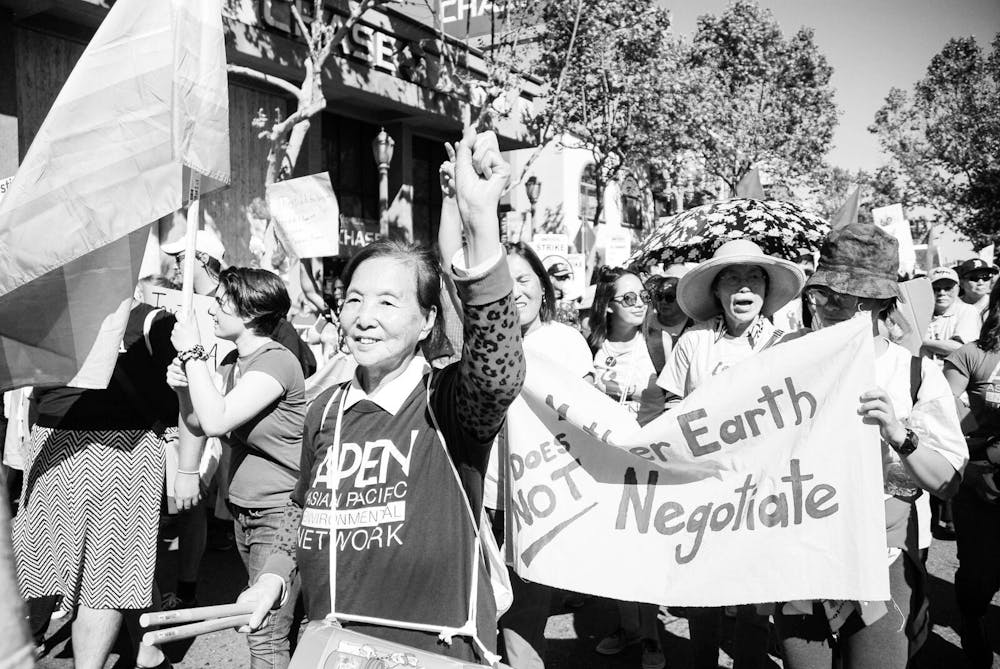Vicha Ratanapakdee, an 84–year–old Thai man, was killed on Jan. 28 in San Francisco after suffering a violent attack. On Feb. 3, a 64–year–old Vietnamese grandmother was assaulted in San Jose, Calif., and a 61–year–old Filipino American was slashed across the face while riding the subway in New York. Within a three–month time span, over 2,100 anti–Asian hate incidents have been reported.
In response to this, Asian American celebrities such as Daniel Dae Kim and Daniel Wu have attempted to take matters into their own hands. They are offering a $25,000 reward for information towards the arrest and conviction of the assaulter of a 91–year–old man in Oakland’s Chinatown. Others have demanded increased surveillance and collaboration with the police.
The recent deaths, murders, and assaults on Asian Americans are enraging and disturbing.
However, calling for more policing is not the solution to anti–Asian violence. Bounties will not protect our Asian elders, and a greater reliance on police and prisons is not what will keep our communities safe.
Last October, the New York City Police Department (NYPD) created an Asian Hate Crime Task Force in response to the growing number of hate crimes against Asian Americans in the midst of the COVID–19 pandemic. While some regarded this as a positive step forward for the Asian community, groups like the Asian American Feminist Collective shared their denouncement of the task force in this open letter. The NYPD has had a long history of perpetrating violence against the Asian community, from the profiling and surveillance of South Asian and Muslim communities, targeting of Asian sex workers, asylum–seekers, and immigrant workers, to the murders and attacks on Asians in New York by law enforcement. Calls for more policing disregard the decades of abuse that the most vulnerable members of the Asian diaspora have endured at the hands of the police.
Violence towards the Asian American community goes deeper than the senseless physical attacks on our elders. It extends to the increasing rates of poverty, gentrification, and policing that working–class families experience across the country. Police and prisons will not resolve these layered forms of violence—they serve to perpetuate them. In Los Angeles’ Chinatown, more than 41% of the population lives in poverty, and “public spaces are increasingly being policed by private security who are hired by the Chinatown Business Improvement District. They have harassed street vendors, musicians, and homeless individuals who make up the community.”

Even so, it is understandable that these traumatic events have been difficult to navigate. Many of us are grappling with the question of how exactly we can demand justice for our elders in ways that don’t rely on the state or trivialize the harm. The problem with the carceral system is that we’re often forced to choose between something or nothing: The only option for accountability is seemingly either our silence or a default to incarceration and punishment. But this is precisely how the punitive system of justice was designed; it doesn’t seek to address harm, or center the victim’s healing, or respond to the needs of the community.
We cannot condemn anti–Asian violence while simultaneously propping up systems that are racist, anti–Black, violent, and oppressive.
Ultimately, abolition is not just the divestment from police and prisons—it's the formation of what writer Stephanie D. Keene calls “communities of care.” There are many organizers who have worked to build these types of support systems. Jacob Azevedo, for example, is organizing volunteers to accompany seniors and anyone in Chinatown on their grocery runs. Asian Pacific Environmental Network, CAAAV: Organizing Asian Communities, and Chinatown Community for Equitable Development are grassroots organizations that have mobilized working–class Asian immigrants and refugees for social, environmental, and economic justice.

Photo courtesy of Asian Pacific Environmental Network
These fights for quality housing, food, air, education, and language access in the Asian American community (and beyond) are directly linked with the vision of abolition. As human rights lawyer Derecka Purnell writes, “Rather than thinking of abolition as just getting rid of police, I think about it as an invitation to create and support lots of different answers to the problem of harm in society, and, most exciting, as an opportunity to reduce and eliminate harm in the first place.” For those interested in directly donating to various AAPI organizations and movements, here is a list of places to support.
It is these forms of mutual aid and multigenerational community care that keep us safe and work toward making the very existence of police and prisons obsolete.







